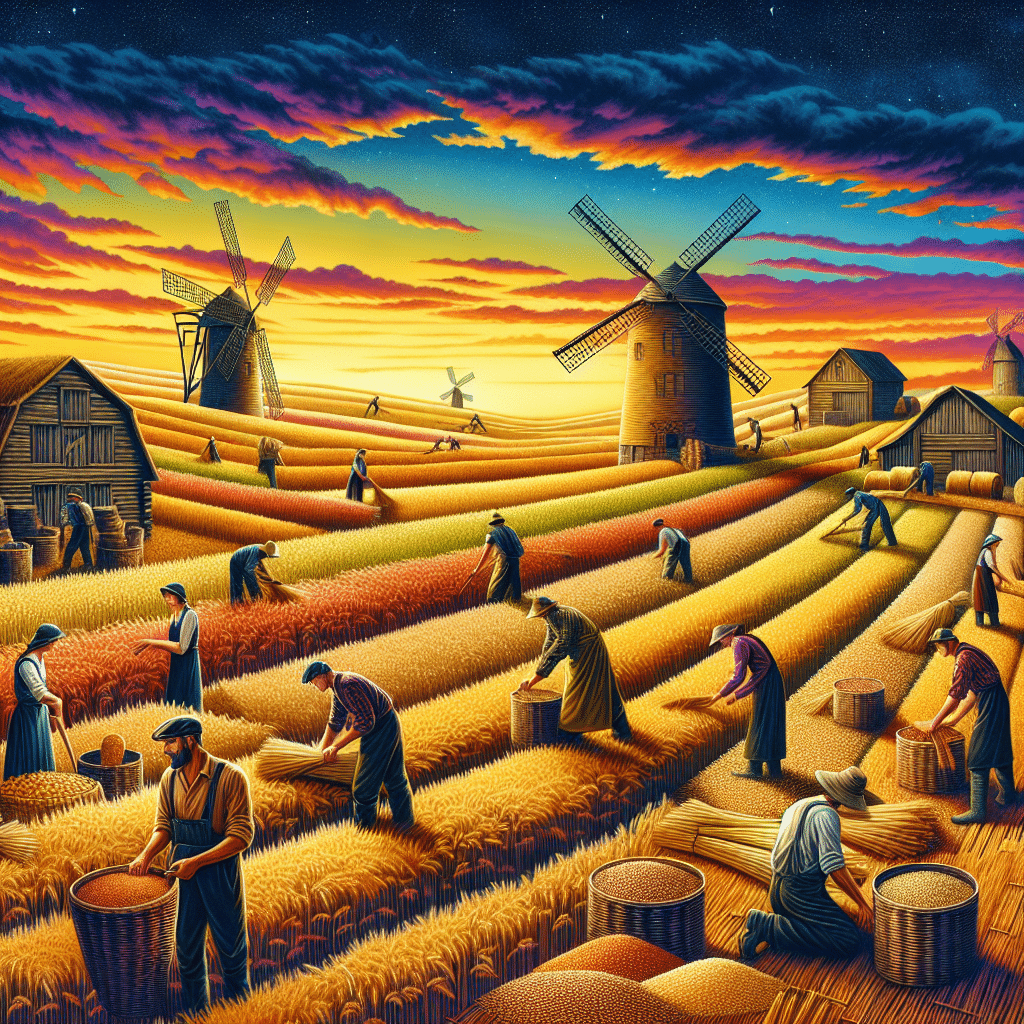The Return of Ancient Grains
-
Table of Contents
- Ancient Grains Make a Modern Comeback: Nutritional and Culinary Revival
- The Rise of Ancient Grains in Modern Diets
- Nutritional Advantages of Ancient Grains
- Case Studies: Ancient Grains in Action
- Statistics: The Growth of Ancient Grains
- Incorporating Ancient Grains into Your Diet
- Conclusion: Embracing the Ancient Grain Trend
- Discover ETChem’s Protein Products
Ancient Grains Make a Modern Comeback: Nutritional and Culinary Revival
In recent years, there has been a significant resurgence in the popularity of ancient grains. These grains, which have been cultivated for thousands of years, are making a comeback in modern diets due to their nutritional benefits, sustainability, and unique flavors. This article explores the reasons behind the return of ancient grains, their health benefits, and how they are being incorporated into contemporary cuisine.
The Rise of Ancient Grains in Modern Diets
The term “ancient grains” refers to a group of grains and cereals that have remained largely unchanged over the last several millennia. Unlike modern wheat, which has been extensively bred and modified, ancient grains are prized for their genetic simplicity and traditional cultivation methods. Some of the most popular ancient grains include quinoa, amaranth, millet, teff, spelt, farro, and sorghum.
Their resurgence can be attributed to a combination of factors:
- Health Consciousness: As consumers become more health-conscious, they seek out nutrient-dense foods. Ancient grains are often higher in vitamins, minerals, protein, and fiber than their modern counterparts.
- Gluten Sensitivity: With the rise of gluten intolerance and celiac disease, many people are turning to gluten-free ancient grains like quinoa and amaranth as alternatives to traditional wheat.
- Sustainability: Ancient grains are typically hardy and can grow in harsh environments with minimal inputs, making them a sustainable choice in the face of climate change.
- Culinary Diversity: Chefs and home cooks are exploring ancient grains for their unique textures and flavors, which add diversity to meals and allow for creative culinary expression.
Nutritional Advantages of Ancient Grains
Ancient grains are not only versatile in the kitchen but also offer a plethora of nutritional benefits. They are generally rich in dietary fiber, which is beneficial for digestive health and can help prevent chronic diseases such as diabetes and heart disease. Additionally, they are a good source of plant-based protein and contain essential amino acids that are often lacking in vegetarian diets.
For example, quinoa is considered a complete protein because it contains all nine essential amino acids. Teff, despite its tiny size, is high in calcium, iron, and resistant starch, which is a form of dietary fiber that can help manage blood sugar levels. Amaranth is another grain that boasts a high protein content and is also rich in lysine, an amino acid scarce in many plant foods.
Case Studies: Ancient Grains in Action
Several case studies highlight the growing trend of ancient grains in various sectors:
- Consumer Packaged Goods: Many health food companies are now offering products like ancient grain bars, cereals, and bread. These products often emphasize the grains’ health benefits and cater to niche dietary needs.
- Restaurants: From high-end dining to fast-casual eateries, chefs are incorporating ancient grains into their menus. Dishes like farro salads, spelt pizzas, and sorghum bowls are becoming increasingly common.
- Agriculture: Farmers, especially those in regions with challenging climates, are turning to ancient grains as a way to diversify their crops and reduce the risk of failure due to extreme weather conditions.
Statistics: The Growth of Ancient Grains
The market for ancient grains has seen substantial growth over the past decade. According to a report by MarketsandMarkets, the global ancient grain market is projected to reach USD 4.8 billion by 2020, growing at a compound annual growth rate (CAGR) of 14.6% from 2015 to 2020. This growth is driven by increasing consumer demand for non-GMO and organic products, as well as a growing awareness of the health benefits associated with ancient grains.
Incorporating Ancient Grains into Your Diet
Adding ancient grains to your diet is simple and can be quite enjoyable. Here are some ideas:
- Breakfast: Start your day with a warm bowl of amaranth porridge or quinoa cereal topped with fresh fruit and nuts.
- Lunch: Mix cooked farro or teff into salads for a nutty flavor and satisfying crunch.
- Dinner: Use millet or sorghum as a base for stir-fries or stews, or bake with spelt flour for a hearty, rustic bread.
- Snacks: Look for snack bars made with ancient grains for a nutritious on-the-go option.
Conclusion: Embracing the Ancient Grain Trend
The return of ancient grains is more than just a passing fad; it’s a movement towards more sustainable, healthful, and diverse eating practices. By incorporating these grains into our diets, we can enjoy the rich flavors and nutritional benefits that our ancestors did thousands of years ago. As consumers continue to seek out foods that are good for both their bodies and the planet, ancient grains are poised to become a staple in the modern culinary landscape.
Discover ETChem’s Protein Products
For those looking to enhance their diet with high-quality protein products, ETChem offers a range of collagen-based options. Whether you’re interested in marine, fish, bovine, or chicken collagen, ETChem provides clean, soluble, and neutral-tasting ingredients perfect for various applications. Their products cater to industries such as nutraceuticals, pharmaceuticals, cosmeceuticals, and food and beverage, ensuring that you can find the right protein solution for your needs.
About ETChem:
ETChem, a reputable Chinese Collagen factory manufacturer and supplier, is renowned for producing, stocking, exporting, and delivering the highest quality collagens. They include marine collagen, fish collagen, bovine collagen, chicken collagen, type I collagen, type II collagen and type III collagen etc. Their offerings, characterized by a neutral taste, instant solubility attributes, cater to a diverse range of industries. They serve nutraceutical, pharmaceutical, cosmeceutical, veterinary, as well as food and beverage finished product distributors, traders, and manufacturers across Europe, USA, Canada, Australia, Thailand, Japan, Korea, Brazil, and Chile, among others.
ETChem specialization includes exporting and delivering tailor-made collagen powder and finished collagen nutritional supplements. Their extensive product range covers sectors like Food and Beverage, Sports Nutrition, Weight Management, Dietary Supplements, Health and Wellness Products, ensuring comprehensive solutions to meet all your protein needs.
As a trusted company by leading global food and beverage brands and Fortune 500 companies, ETChem reinforces China’s reputation in the global arena. For more information or to sample their products, please contact them and email karen(at)et-chem.com today.





